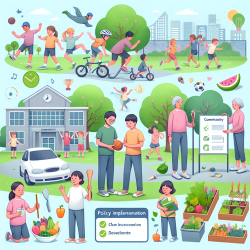Child health extends beyond the confines of clinical settings, deeply intertwined with the social and physical environments in which children grow. The research article "Beyond the clinic: improving child health through evidence-based community development" underscores this reality by advocating for community-level interventions that address the broader determinants of child health. This blog post aims to guide practitioners in enhancing their skills by implementing these research findings and encouraging further exploration into community-based strategies.
The Importance of Community-Based Interventions
The research highlights a critical insight: pediatricians and child health advocates can significantly impact children's wellbeing by supporting evidence-based strategies within their communities. These strategies are designed to tackle both distal influences (such as income and resources, social cohesion, and physical environment) and proximal influences (including family, school, and peer dynamics) on child health.
Key Findings from the Research
- Distal Influences: Strategies like tenant-based rental assistance and urban design policies have shown efficacy in improving child health outcomes by altering broader environmental factors.
- Proximal Influences: Interventions such as quality childcare services and after-school programs that promote personal/social skills have demonstrated positive impacts on cognitive development and social competence.
- Policy-Relevant Strategies: The study identified 46 strategies meeting scientific criteria for efficacy, with consistent positive outcomes from high-quality trials.
Implementing Evidence-Based Strategies
Pediatricians and practitioners can play a pivotal role in advocating for these strategies within their communities. Here are some steps to consider:
- Advocacy: Engage with local policymakers to promote the adoption of evidence-based interventions that align with the research findings.
- Collaboration: Work alongside community organizations to implement programs that address both distal and proximal influences on child health.
- Education: Educate families about the benefits of these strategies and how they can participate in creating healthier environments for their children.
The Role of Further Research
The research also emphasizes the need for ongoing investigation into community-level strategies. Practitioners are encouraged to contribute to this body of knowledge by participating in studies or initiating new research projects that explore innovative interventions tailored to local contexts.
Conclusion
The synthesis of evidence-based strategies presented in the research offers a roadmap for practitioners aiming to improve child health outcomes through community engagement. By implementing these strategies, practitioners can help create nurturing environments that support children's cognitive, social, emotional, and physical development.
To read the original research paper, please follow this link: Beyond the clinic: improving child health through evidence-based community development.










